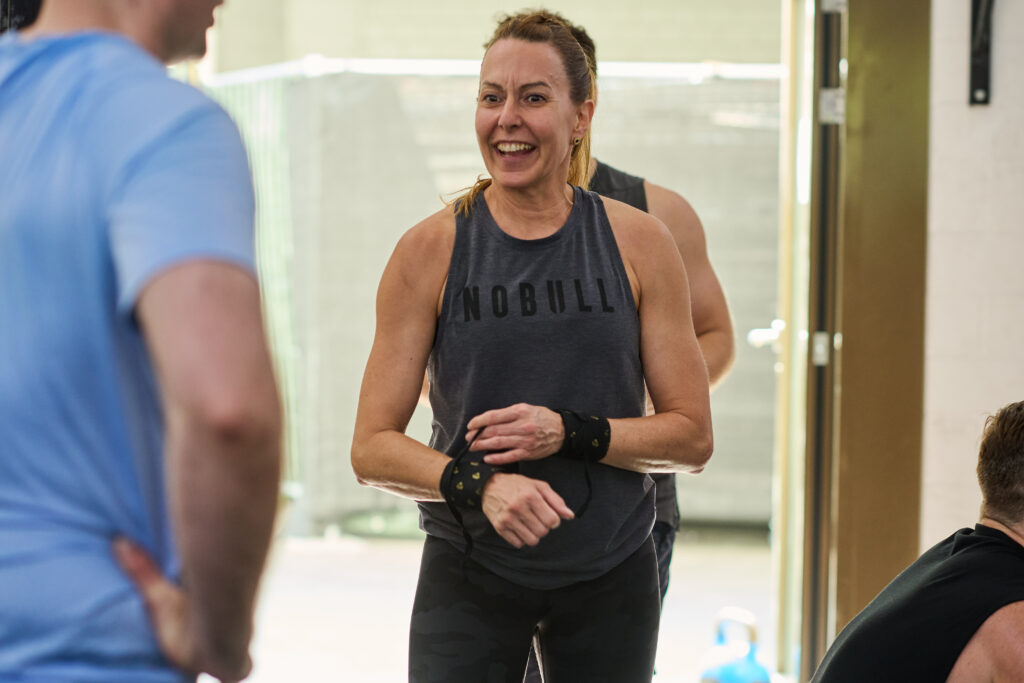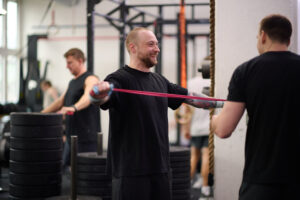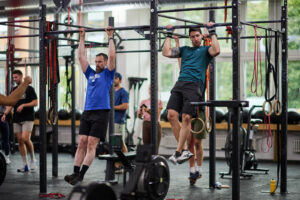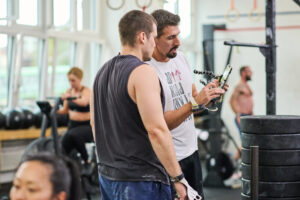
What everyday athletes can learn from professional athletes goes far beyond how much they train—it’s about how they think, recover, and invest their time and energy.
You’re not getting paid to train. You don’t have a recovery team, a chef, or a sponsor. But you do have goals—and probably limited time and energy to reach them.
So if you’re going to invest in your fitness, why not borrow a few lessons from those who make a living from theirs?
Surprisingly, what separates professional athletes from the rest of us isn’t always talent or time. It’s how they think. They approach training like investors: calculating risk, maximizing return, and never leaving recovery to chance.
And that’s exactly what everyday athletes can learn—how to stop wasting energy and start making every rep count.
At CrossFit Kreis 9, we’ve studied this closely. Over the years, we’ve worked with competitive athletes, attended countless seminars, and spoken with some of the best coaches in the field. But the biggest shift didn’t come from what we were told to do—it came from seeing how elite athletes live. And most importantly, understanding what’s worth applying to the life of a busy professional.
Here’s what everyday athletes can learn from professional athletes, and what you might want to borrow.
Lesson 1: What everyday athletes can learn from professional athletes about training volume
Contrary to what most people think, elite athletes don’t spend 8 hours a day in beast mode. While their full-time job includes a lot of time spent on their craft, the training part is well-structured, focused, and not excessive. Often, it’s just a few hours a day—divided into skills, strength, conditioning, mobility, and recovery.
They don’t train for soreness. They train for progress.
Everyday athletes, on the other hand, often fall into the trap of doing more when progress stalls. Adding volume, doing extra cardio, training on rest days. But more isn’t better if your body can’t absorb the work.
At CrossFit Kreis 9, we’ve learned to look at training like dosing medicine. What’s the minimum effective dose that leads to real adaptation? We teach our members to stop chasing exhaustion and start chasing results.
Lesson 2: Recovery is part of the program
Professional athletes treat recovery like it’s their job—because it is. Sleep is non-negotiable. Nutrition is calculated. Stress is managed. Not because they’re obsessed with wellness, but because without recovery, all that training is just digging a hole.
This is another area where what everyday athletes can learn from professional athletes can make a huge difference. You might train four times a week but sleep six hours a night. Or you’re skipping meals, eating on the go, and wondering why your energy is low.
What we’ve learned: If you don’t recover, you don’t improve.
You don’t need perfection—you need consistency. Start with these non-negotiables:
- 7–9 hours of sleep per night (every single top-level athlete prioritizes this)
- Enough protein to support muscle repair and growth
- Regular meals to keep energy and hormone levels stable
- True rest days—not active recovery that turns into another workout
Recovery isn’t the reward. It’s part of the plan.
Lesson 3: ROI matters more than volume
Professional athletes aren’t just training hard—they’re constantly evaluating what actually works. They think in terms of return on investment: what gives the best results with the least unnecessary wear and tear?
This mindset shift is powerful. It’s not about how many hours you spend in the gym or how exhausted you feel afterward—it’s about what your training delivers.
Smart training focuses on quality over quantity. That means:
- Prioritizing strength and movement quality over endless reps
- Incorporating Zone 2 cardio to build long-term aerobic capacity and aid recovery
- Practicing skills and technique to boost both competence and confidence
- Scheduling deloads and test weeks rather than relying on random variety
You don’t need to train like a pro—but if you want sustainable progress, start asking: Is this workout building me up or just breaking me down?
Lesson 4: The body counts everything
Here’s something pros understand deeply: your body doesn’t separate training stress from life stress. Lack of sleep, a stressful job, poor nutrition—those all impact recovery and performance.
This realization changed how we talk to our members. When someone’s performance dips, we don’t just look at their training logs. We ask: how’s your sleep? How’s work? Are you eating enough? Are you overwhelmed?
At a certain point, your training is only as effective as the life that supports it. If your energy is low, you’re getting sick often, or you feel stuck—it’s probably not the workout that’s the problem. It’s everything around it.
Final thoughts: Be your own pro
What everyday athletes can learn from professional athletes isn’t about copying their routines—it’s about learning their mindset.
They don’t succeed because they push harder. They succeed because they understand the relationship between stress and recovery, and they train with long-term return in mind.
At CrossFit Kreis 9, we’ve learned that this mindset works incredibly well for busy professionals. Our clients aren’t looking to compete—they’re looking to stay strong, healthy, capable, and injury-free. And the best way to get there is to think like an athlete—even if you never plan to be one.
So sleep like it matters. Eat like it fuels your goals. Train with purpose. Recover like it’s part of the process. And most of all—respect your body enough to give it what it needs.
You’re already investing in your fitness. Now make sure the return is worth it.




